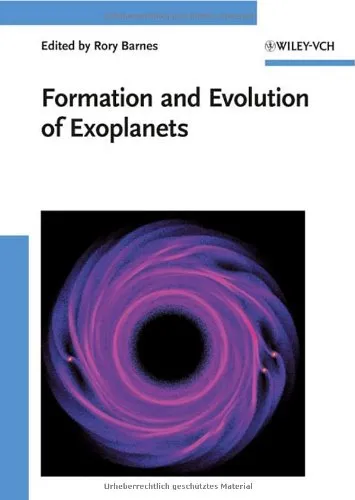Formation and Evolution of Exoplanets
4.0
Reviews from our users

You Can Ask your questions from this book's AI after Login
Each download or ask from book AI costs 2 points. To earn more free points, please visit the Points Guide Page and complete some valuable actions.Introduction to 'Formation and Evolution of Exoplanets'
The study of exoplanets, or planets that exist outside our solar system, represents one of the most fascinating and dynamic fields in modern astrophysics. Written with both scientific rigor and an engaging narrative style, my book, “Formation and Evolution of Exoplanets”, is an in-depth exploration of how these distant worlds form, evolve, and ultimately shape our understanding of the universe. This introduction provides a detailed overview of what readers can expect from the book, the scientific and philosophical significance of its content, and some of its most memorable insights.
Detailed Summary of the Book
“Formation and Evolution of Exoplanets” delves into the core physical mechanisms and theoretical frameworks governing the birth and development of exoplanets. From understanding how protoplanetary disks foster these enigmatic bodies to the factors influencing their migration and orbital instabilities, the book stays grounded in the latest observational data. It also touches on the diversity of planetary systems discovered so far, discussing exoplanet types ranging from terrestrial Earth-like planets to gas giants and so-called "hot Jupiters."
Beyond individual planets, the book probes broader questions—How do exoplanet populations vary across the galaxy? What role does the host star play in planetary formation? And, perhaps most significantly, could these distant worlds harbor life? The discussion branches into cutting-edge scientific topics such as planetary atmospheres, habitability zones, and the mysterious phenomenon of rogue planets.
Spanning fundamental concepts for readers who are new to the field and advanced material for astrophysics enthusiasts, this book serves as both an educational resource and a call to curiosity. It encourages the reader to imagine beyond numbers and models, inspiring deeper philosophical questions about humanity’s place in the cosmos.
Key Takeaways
- Understanding the stages of planetary formation, from dust clouds to full-fledged planets.
- An exploration of the diversity of exoplanetary systems and what they reveal about stellar environments.
- The central role of gravitational dynamics, disk instabilities, and stellar metallicity in shaping planetary architectures.
- The role of cutting-edge technology, such as space-based telescopes, in advancing the discovery of exoplanets.
- Prospects for identifying habitable exoplanets and the search for extraterrestrial life.
By concentrating on these foundational moments and mechanisms, readers will walk away with a structured and nuanced comprehension of exoplanet science, empowering further exploration into related subjects.
Famous Quotes from the Book
"Each exoplanet tells a story, not just of its own origins, but of the endless creativity of the cosmos."
"The discovery of exoplanets has transformed us from dreamers to explorers, reaching into the depths of space with more than just imagination."
These quotes encapsulate the heart of the book, which seeks to connect scientific details to the profound wonder that drives humanity’s quest for knowledge.
Why This Book Matters
The past three decades have seen an exponential rise in the discovery of exoplanets, pushing the boundaries of our understanding of planetary systems. Despite this progress, the scientific community and the public alike often grapple with the seemingly infinite complexity of this subject. “Formation and Evolution of Exoplanets” fills this gap by condensing a vast array of knowledge into an accessible, coherent, and thought-provoking narrative.
This book is not limited to theoretical scientists—it’s for anyone who has ever looked up at the night sky and wondered about the countless stars and the worlds that orbit them. Furthermore, as we sit on the cusp of potentially finding habitable exoplanets, understanding their formation and evolution is more critical than ever for contextualizing any future discoveries.
Ultimately, this work contributes to building a bridge between rigorous science and human curiosity, helping readers appreciate not just how exoplanets form, but what those findings mean for us as explorers of the vast cosmic frontier.
Free Direct Download
Get Free Access to Download this and other Thousands of Books (Join Now)
For read this book you need PDF Reader Software like Foxit Reader
Accessing books through legal platforms and public libraries not only supports the rights of authors and publishers but also contributes to the sustainability of reading culture. Before downloading, please take a moment to consider these options.
Find this book on other platforms:
WorldCat helps you find books in libraries worldwide.
See ratings, reviews, and discussions on Goodreads.
Find and buy rare or used books on AbeBooks.


